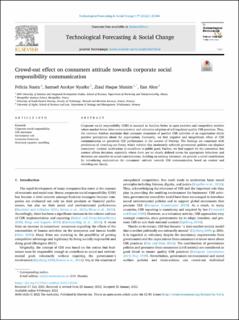Crowd-out effect on consumers attitude towards corporate social responsibility communication
Peer reviewed, Journal article
Published version
Permanent lenke
https://hdl.handle.net/11250/2998058Utgivelsesdato
2022Metadata
Vis full innførselSamlinger
Originalversjon
Naatu, F., Nyarko, S. A., Munim, Z. H. & Alon, I. (2022). Crowd-out effect on consumers attitude towards corporate social responsibility communication. Technological Forecasting and Social Change, 177, Artikkel 121544. https://doi.org/10.1016/j.techfore.2022.121544Sammendrag
Corporate social responsibility (CSR) is assumed to function better in open societies and competitive markets where market forces drive communication and voluntary adoption of self-regulated quality CSR practices. Thus, the common wisdom maintains that consumer awareness of positive CSR activities of an organisation elicits positive perceptions about the organisation. Contrarily, we find negative and insignificant effect of CSR communication on perceived CSR performance in the context of Norway. The findings are consistent with predictions of crowding-out theory which submits that moderately enforced government policies can displace consumers’ intrinsic motivations to contribute to public good. Further, we find support for the contention that context affects decisions, especially where there are no clearly defined norms for appropriate behaviour and decisions are sensitive to social considerations. Building on existing literature, we provide a novel contribution by introducing explanations for consumers’ attitude towards CSR communication based on context and crowding-out theory.

